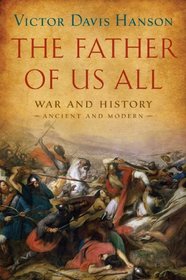Overall, this is a well-written, passionate argument the military history is just as vital a field of study as ever, and that the ideas that we have grown beyond war-making or that war is somehow a different beast than in the rest of human history are junk.
When he confines himself to making these points, Hanson is persuasive. He draws clear parallels between modern wars (particularly the war in Iraq, but also the first Gulf War, Vietnam and several other military engagements in the second half of the 20th century) and any number of wars in the ancient world. He shows clearly that all the issues popularly believed to plague only modern wars (technological advances changing the face of war, tensions between democratic governments and military hierarchies, and the shift from pitched battles to guerrilla warfare, to name a few) are in fact cyclical changes that have occurred and recurred throughout history.
Hanson also spends some time discussing the one area he thinks modern wars do differ from all the wars that came before -- modern America's idea that it is possible to wage a perfect war -- perfection meaning a war that accomplishes its political goals quickly, with no loss of life on our side and minimal loss of life on the other side -- and that anything short of that perfection is a complete failure. He sees that idea as incredibly misguided and incredibly dangerous, and he traces it back to the way that significant increases in our standard of living and life expectancy have made us unwilling to accept any sacrifices of those lives. He backs this claim up with no particular evidence (he isn't, after all, either a psychologist or a cultural anthropologist) but it seems like a rational conclusion.
He is on shakier ground when he argues that democracies are inherently better able to wage and win wars -- he states that they are multiple times, but never backs up that claim with any particular evidence. But that is a fairly minor thread in the volume, though I wish it had been developed further.
But the volume has one glaring flaw. Hanson extends his claims, over and over and over again, to sweeping statements about the entire human race and all of human history, but the only specifics he gives on any topic he addresses are drawn from the history of the Western world -- he talks about ancient Greece (and ancient Persia, but only as it relates to Greece), he talks about continental Europe, and he talks about the U.S.A. -- never once does he mention any actions that take place outside of that sphere. This would not have bothered me if his claims had been more specific, more measured, but in his attempt to make his argument universal he displayed an enormous blind spot that undercut all the solidly reasoned, persuasive work that came before and after.
When he confines himself to making these points, Hanson is persuasive. He draws clear parallels between modern wars (particularly the war in Iraq, but also the first Gulf War, Vietnam and several other military engagements in the second half of the 20th century) and any number of wars in the ancient world. He shows clearly that all the issues popularly believed to plague only modern wars (technological advances changing the face of war, tensions between democratic governments and military hierarchies, and the shift from pitched battles to guerrilla warfare, to name a few) are in fact cyclical changes that have occurred and recurred throughout history.
Hanson also spends some time discussing the one area he thinks modern wars do differ from all the wars that came before -- modern America's idea that it is possible to wage a perfect war -- perfection meaning a war that accomplishes its political goals quickly, with no loss of life on our side and minimal loss of life on the other side -- and that anything short of that perfection is a complete failure. He sees that idea as incredibly misguided and incredibly dangerous, and he traces it back to the way that significant increases in our standard of living and life expectancy have made us unwilling to accept any sacrifices of those lives. He backs this claim up with no particular evidence (he isn't, after all, either a psychologist or a cultural anthropologist) but it seems like a rational conclusion.
He is on shakier ground when he argues that democracies are inherently better able to wage and win wars -- he states that they are multiple times, but never backs up that claim with any particular evidence. But that is a fairly minor thread in the volume, though I wish it had been developed further.
But the volume has one glaring flaw. Hanson extends his claims, over and over and over again, to sweeping statements about the entire human race and all of human history, but the only specifics he gives on any topic he addresses are drawn from the history of the Western world -- he talks about ancient Greece (and ancient Persia, but only as it relates to Greece), he talks about continental Europe, and he talks about the U.S.A. -- never once does he mention any actions that take place outside of that sphere. This would not have bothered me if his claims had been more specific, more measured, but in his attempt to make his argument universal he displayed an enormous blind spot that undercut all the solidly reasoned, persuasive work that came before and after.




